#doing lit crit of stories within stories - what a trip
Text
Mary Jane and Frankenstein
In honor of Spooky Month and the imminent arrival of Mary Jane Day, I have done the scariest thing imaginable, returned to tumblr dot com to write a meta/analysis post.
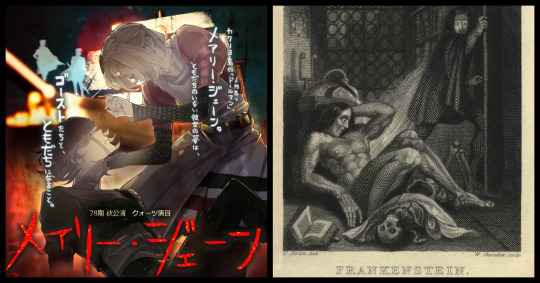
[image description: images side by side of the top of the Mary Jane poster, showing Mary looking down sewing Jacob, next to the 1831 edition front panel illustration of Frankenstein, showing Victor looking down on his creature in horror]
This is a mostly informal attempt to collect my thoughts on the fact that Neji’s little spooktacular, in addition to being a very pointed exploration, as all of his plays are, of art and theater, the school, himself and his classmates (without their permission, the menace) and just, a lot of fun, is perhaps one of the best piece of Frankenstein related media I have EVER seen in relation to the original novel.
This is pulling a lot of things from the Stage Script rather than the in game version, which summarizes a lot of the things I'm mentioning specifically. You can find the full Stage Script in the game menu, or
[ here ]
because I love this play so much that I needed a searchable version.
Caveat Emptor here is that it’s been a long time since I’ve read the novel in its entirety. If this game gets me to read it again, I may have to revamp things. But again, largely informal. But very long, somehow.
Oooops.
If you're curious about anything in here and want to expand on it more, or hear my thoughts on it, please feel free to reblog, send an ask, or message. Or ask me elsewhere if we're already connected there. There's a lot I glossed over, especially at the end of this. I have a lot to say, and if we're back to writing metas on tumblr dot com the chances of stopping at one are slim.
Mary as Frankenstein, Mary as Mother
Mary’s name is acting as several allusions at once. I mean, there are at least 3 Mary’s in the bible one could point to - Mary, Mother of Jesus is absolutely at play. But Lazarus’s sister is also a Mary. And while technically Mary Magdalene is often misrepresented and amalgamated with other characters in retellings, the idea of “purifying” her has canon precedent - having had seven demons driven out of her.
Of course, Neji’s twisting all of it, in his Neji way.
(Interestingly enough, these are the Three Marys of the Quem Quaeritis - widely considered a point of "rebirth" of theatre in Europe during the middle ages.)
But Mary is also the name of Mary Wollstonecraft Shelley, author of Frankenstein. And this, this is a Frankenstein story. It is, in fact, a beautiful inversion of so much about the book that gets left out in most far more serious attempts at a Frankenstein story.
The original book is about motherhood and its inversion. Much could be said about when during her life she wrote it, or her own mother’s death shortly after she was born, or any number of things that have been hashed and rehashed a thousand times from AP English to the ivoriest of towers. But, fan of Death of the Author that I am, I posit you don’t need any of that to see in the text.
Victor creates a person with science, rather than by ‘nature’. It is an unnatural birth. And Victor is just about the shittiest possible parent. The Creature spends a good deal of time explaining to him, when they meet up again, that Victor is his father, and that he was literally abandoned as a newborn, and maybe that was kind of the worst possible thing he could have done. It’s not a mantle Victor has any desire to take up, the role of a parent. He wanted to create life, but he didn’t want to be a parent. But that’s what it means to create life.
By gender swapping the role, you’re already inverting the inversion - but Mary’s creation is no more “natural” than Victors. But it is different. Neji, ever witch-coded himself, has Mary put one of her own hairs into every doll. It’s returning the shared body to the act of bringing these creations into being.
But even without that. Mary considers herself a mother. She considers herself a mother despite having no memory of one herself - Mary knows lots of things she shouldn’t, and doesn’t know many things she should. But she calls herself a mother. Even before any of the dolls move, she is their mother. A motherhood she wants to desperately share with others. She considers the act of selling a doll a kind of ‘adoption’. These are her children. And they know it. It’s stitched into every stitch in their doll bodies. They know Mary is their mother. And they know she loves them.
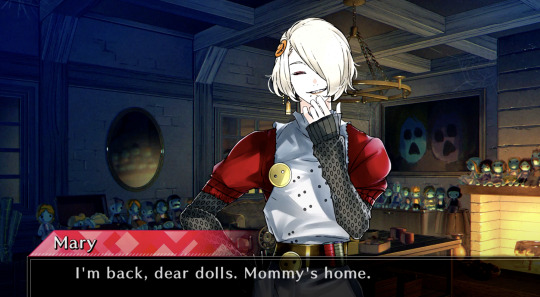
[image description: screenshot of Mary in her workshop. The text shows Mary's line saying "I'm back, dear dolls. Mommy's home."]
The Creature comes to think of Victor as a father - an absentee one at that, and craves that love, a love he is never shown. Mary averts this spectacularly. She creates out of love.
Names
Mary takes great care in naming Jacob, and ends up doing so, though she doesn’t say it, after a biblical pun (Jacob, in the bible, is explicitly named such as a pun on the word “Heel”). But names are important to Mary, and she is sure to give one to Jacob as soon as he’s fully formed, even before she sees him wake up. Victor very particularly does not name his creature. Instead, he tends to throw around insults, many of which are demonic or satanic. When they finally meet again, the Creature says to him “I should have been thy Adam.” Mary averts this mistake, among so many others, spectacularly. Being called by her name is important to her, and she extends that offer to Jacob even before he’s fully “born.” Like a good mother.
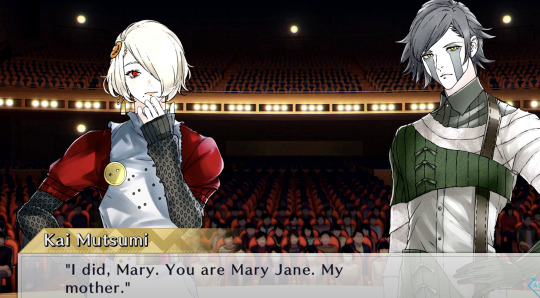
[image description: a screenshot showing Fumi and Kai dressed as Mary and Jacob, as seen from the stage with the audience in the background. Kai is saying Jacob's line "I did, Mary. You are Mary Jane. My mother."]
Not only does she give him a nice biblical pun of a first name, she shares her last name with him, again before he’s even more than a doll. That’s her boy, that’s her best friend. That’s her family.
The song here, which is only sung and dance AFTER Mary has given him a name is called "A Friend Without A Name" Almost as if specifically calling attention to this fact. Mary is as much the friend without a name as Jacob, if not more. She is the one that has never heard another voice say her name, where as Jacob is called his before he's even awakened by the Island's magic and Mary's love.
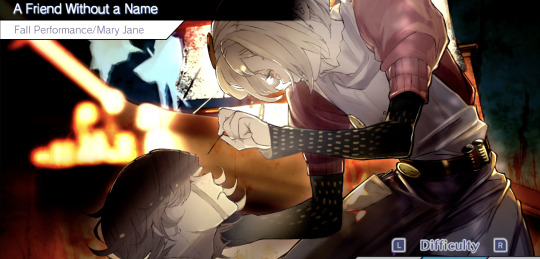
[image description: the screen from just before A Friend Without A Name showing Mary and Jacob's CG of Mary Stitching Jacob.]
Mary as a Good Mother
Some of the weirder moments in the play actually make a lot more sense when you look at them through this light. Jacob randomly saying he hates Mary in a fit of jealousy? It’s because he’s a child. He’s a baby. That’s a baby boy. Mary, herself quite childish, forgetting so much of what’s important, as the Island is known for, reacts incorrectly, but understandably. This is her first friend - and far more of one than the others she thinks she’s made, in terms of mutual respect, compassion, and small acts of kindness. But this level of connection and emotional reciprocation is still new to her. She’s hurt. She runs.
And The Order of Shadow’s duo is quick to tell her that that’s just the nature of ghosts, telling themselves a little joke about how they have been lying to her from the start, and fully intend to stab her in the back, far more than any ghost. Victor’s instinct is to consider his creature a monster, a fiend, a demon. Mary is told by characters positioned as far more knowledgeable about the world than her that he must be exactly that.
And how does Mary react? She refuses to believe it. Even hurt as she was, even with someone who just said this is their entire expertise telling her it’s in his nature to be cruel, Mary refuses to accept it. She still loves him. She makes the right choice. That’s her best friend. That’s her family. That’s a (un)life she brought into this world, and she stands by him. No matter what. She would risk her life to rescue him. She will fight for him.
This is why that scene has to be there. Because she has to be given that temptation, that trial. And she passes spectacularly in a way Victor will not, to the end.
It’s also a thematic explanation for the garbage scene, which is probably there as much to be silly as anything. I mean, it’s also there to show many other things — Mary’s eccentricity is ingenious in its own quirky way — the islanders who hated her, who she didn’t understand, give her the tools to save Jacob and the others — Mary not even considering the same level of violence — it being a moment of empathy between Mary and the islanders who never showed her even a shred of it back — she understands that they couldn’t tell which food was rotten. She sees things from their point of view. And many more besides.
But, from the point of view of Mary as a Mother, Mary succeeding brilliantly where Victor failed… Mary is literally willing to coat herself in filth to rescue Jacob. Parenthood is messy. It involves a lot of gross things. Even Victor's, sanitized of the normal processes and cloaked in science, was made of corpse parts. But the play actually brings back a part of parenthood that Mary had been able to avoid thus far - the mess. Mary, once again, doesn’t hesitate. For Jacob? She’ll do anything.
Jacob is shown love and kindness, and he responds with the same. He has the same unnatural strength as Victor’s creature, but he’s only ever shown using it to rescue himself and others. When Mary asks for a handshake, he replies that he can’t, because such would be an invitation for a duel. And that they should hug, instead. Mary didn’t even know what that was. Far from disgusted by the lack of warmth she feels from his skin, she looks beyond that, to the emotional warmth and connection.
Frankenstein’s creature, famously, lashes out in violence. While Victor views this as his responsibility only in so far as he brought a demon into the world, he doesn’t understand, even when the Creature eloquently explains it, that the Creature was a being who had only known cruelty.
Jacob knows love. He knows kindness. He knows sadness and loneliness and pain. And refuses to engage in any form of touch that could even be considered violence. They hug.
Which is not to say Mary’s creatures can’t kill. But they do only to protect their mother, and only after Mary has risked everything to protect Jacob. They are Mary’s children, not Victor’s. Even their violence is an act of love.
And in another inversion - they are the ones telling Mary to run. Something she does not want to do. She doesn't want to leave them behind. After all, they are her children. She departs from them only at Jacob's literal tug away, and with an apology and a thanks.
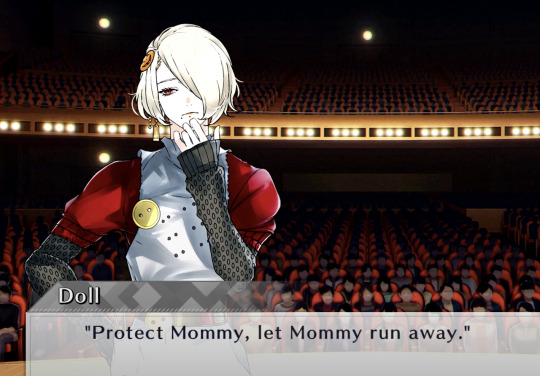
[Image description: screenshot of Fumi, dressed as Mary Jane, shown from stage view, with the audience behind, while a Doll's lines "Protect Mommy, let mommy run away." are shown below.]
Boats and Framing
But the parallels are not only in the most famous part of the novel - consider this - Frankenstein, the novel, is written as a series of nesting framing narratives. The bookend narrative, the one we open and close on, is a boat. Most Frankenstein adaptations cut the boat trip frame, but Mary Jane very specifically opens and closes on a boat at sea, and its ending is EXACTLY the reverse of Frankenstein’s. If for some reason you’re this far in and don’t want more spoilers for a 200 year old book, now’s the time to click away, I guess.
The boat is on a course to the Arctic. Victor is on board, telling his story, because his creature has fled there, away from humanity. Victor intends to pursue him endlessly, to kill him, fully aware that he is almost certainly going to die, frozen and alone, in the process. We don’t get to see this happen - the story ends merely with the certainty that this is what is coming. Victor, on a boat, intending to go to the ends of the earth alone to kill the Creature he brought into the world, treating it like some burden and punishment.

[image description: a screenshot from Mary Jane, with the CG of Mary and the Ghosts on the ship, with the summary text overlayed on it reading "Friends together, fun forever."]
How does Mary Jane end? With Mary, and Jacob, and a cast of playful characters — her friends — sailing off for the ends of the world, together, in pursuit of life and happiness - even in death.
Ghost Party ends the play because its a triumph. Neji throwing out Horace’s Ode to Cleopatra in there because he can’t not do silly things like that — but Frankenstein famously contains many references to classics — many made by the Creature himself, who was forced to educate himself via books, lacking a parent to help him.
Mary Jane takes a section of sheer joy out of a poem of complex mixed emotions, and says them repeatedly. This is a party. This is a triumph. Mary leaves on a boat for the ends of the world a success, a good mother, a friend. And a human.
Humanity, Connection, Isolation
The play deconstructs so wonderfully this question of humanity. Mary doesn’t find any joy in it, despite barely understanding it herself - until she is able to use it to help others. The first time in her life she’s been glad to be human - something she only really understands as “needing to eat food” - is when it gives her the ability to save her ghost friends. If that’s what humanity is, the ability to care for others, the ghosts of the chapel, the play is telling us, are far more human.
One of my favorite exchanges in the play is after Charles and Figaro explain to Mary that the corpse parts used to make Jacob were their friends. Mary is not malicious in the least. She has no concept of this act as sacrilege or desecration. She is genuinely childishly innocent in most of what she does. And she can’t understand it.
Mary says “If you can love unmoving corpses so much… How can you not feel for living ghosts...?"
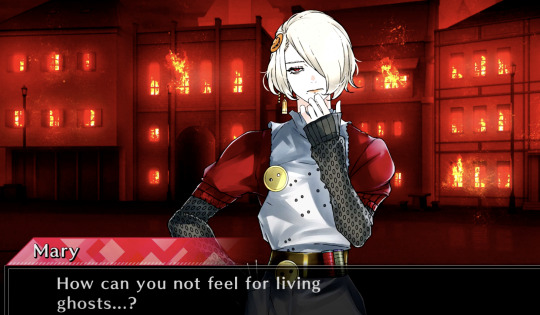
[image description: Mary in front of the burning town. She's saying "How can you not feel for living ghosts...?"]
Charles responds that she must be completely off her rocker. But she’s correct. Mary sees life in front of her, even undead life, and wants to protect it. Even the Islanders, who only ever treated her with distain, who only ever made her miserable — she doesn’t want them to die, even knowing they are already dead.
Outside of Mary, her oddball eccentric self, in this play, the more human someone is, the crueler they are. Figaro and Charles are only ever here to mess with her before dragging her off to be killed. They have no willingness to even try to understand anything outside their world view. The Islanders, who think themselves human, revile Mary, and make up terrible rumors about her.
Both of these groups do so, in part, for similar reasons. Because to have empathy would force a realization on them they cannot bear. The last thing Figaro realizes, before he’s dragged into the most poetic of justices, is that the dolls have SOULS. They are ALIVE. It’s a moment of anger and madness, but it’s a last minute realization that he’s been wrong now that it’s too late. Of course it’s not a revelation he’ll remember. You tend to forget what’s important on Kakuriyo Island.
If Mary averts all of Victor’s mistakes, Charles and Figaro make many of them. Seeing the Creature as a collection of corpses, as demonic, as an abomination against God. Reacting only in anger, in cruelty, in violence. Chasing something they view, wrongly, as an abomination to the ends of the earth, until it kills them. Mary has Victor’s role, but Victor’s actions and outlook are given to the antagonists.
It’s fascinating to me, then, that there are two of them. In the version of the play that gets performed, they’re twins - doubles. Two halves of one whole, who egg each other along in their cruelty. But they also exist to show that even these two are capable of empathy and connection. They do in fact understand the thing they tease Mary with. They have the ability and understanding to extend that to Ghosts, or to Mary. They simply refuse to. Figaro really does love his brother - his grief at his death is genuine. It’s a clever way to show that.
In the book, Victor is extremely isolated, by his own choice. He withdraws from everyone in order to work on his creature, and after he runs from it, he keeps to himself just as much, now blaming the idea that he can tell no one what he’s done. Even when he’s surrounded by family, he is utterly alone. By choice. The Creature eventually lashes out and kills the woman Victor intended to marry. In Victor’s mind, he cares about this girl, but it is not in his actions. Like much else, she exists more as a creation of Victors mind than something in the world for him to interact with and care about. Until she dies. Then he’s furious. And decides to spend the rest of his life chasing down the Creature to kill him for it.
This contradiction in Victor has always read as intentional to me. The book is calling out his hypocrisy here. He doesn’t actually desire connection - the connection his Creature eloquently explains his longing for. But if it is denied him, he acts like he’s been affronted, painted with a shallow layer of sanctimoniousness or justice. Murder is bad, of course, and the Creature shouldn’t have killed an innocent young woman to get at Victor, of course. But the discrepancy between the way Victor reacts to her in death and the way he does when she’s alive is intentional.
Victor has every chance for human connection. Time and time and time again he’s given that chance and refuses it. Even to the very end, on that boat. He could stay with the crew. Sail back home. Let it go. The Creature has run away from humanity which it has come to despise as much as its absentee father disdained it. There is no need to keep chasing. But Victor cannot let it go.
The Creature longs for connection and is denied it. Victor disdains and refuses it, even when it’s available to him.
Mary as The Creature
Contrast this with Mary — It is Mary, rather than Jacob, that is in the Creature’s situation here. Mary is constantly chasing connection. Constantly trying to find something to reflect humanity (compassion, life, emotions — rather than the matter of blood and flesh that Figaro and Charles always talk about it as) back at her. And she can’t get it. She, like the Creature, hides in the bushes and watches it from afar. She, like the Creature, chases after it only for people to run away, to treat her with cruelty. Mary is Frankenstein, but she is also a reflection of the Creature. She is both in one, in this sense.
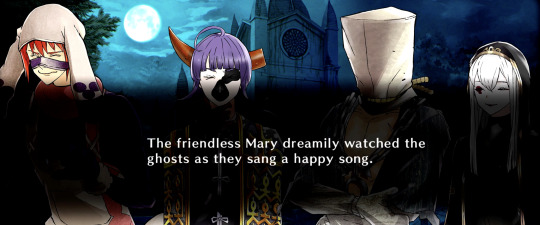
[image description: screenshot of summary text over the church and figures of the church ghosts. it reads "The friendless Mary dreamily watched the ghosts as they sang a happy song.]
Her costume specifically makes her look nearly as much the doll as the ones she makes - in the world of the story, because she's sewing both - but thematically, it ties her to them not only as their mother, but as a reflection of the Creature, herself.
Like the Creature, Mary is an odd mix of naivety and childishness, with startling gaps in her knowledge, and extreme skill and adult abilities. She knows what she knows well. Like the Creature, Mary has no memory of kindness, of family, of parents. She has only ever seen it in the way the Islanders interact with each other. She is the Creature here - raising herself, learning of the world through watching it, being reviled for every attempt she makes to reach out.
One thing the Creature explains to Victor is that he didn’t even understand, at the time, why he was being treated this way. He had no awareness of his own nature and what he looked like in the eyes of others. Only that they ran in fear and chased him away, and reacted with violence.
Mary Jane inverts this. Mary is human, but the humans around her are something she cannot understand. Like the Creature, Mary doesn’t understand why people react this way. The book expects you to come to the same conclusion as the play - the fault lies not with the Creature anymore more than it does with Mary, at this point. It is those around him, those around her, that are at fault, that are a thing neither can understand. Human’s are cruel. Ghosts who think they’re humans are cruel. It is a disconnect between themselves and the world around them they don’t understand, and desperately try to bridge over and over.
Even Mary, as quirky and childlike as she is, is on the verge of giving up, of being consumed by the Lonely Darkness. We don't know what her fate would have been if the Order of Shadows had not come. Victor's Creature, far more morose than Mary, gives up on connection, as well. He is denied the most basic of needs, and eventually, he learns the violence and hatred being directed at him, and, newborn that he is, lashes out.
But, ultimately, companionship and connection are the Creature’s goals, and it is that that he requests of Victor, who refuses to provide it himself. Make for me a mate. Mary is the Creature, and she is Frankenstein. She makes a friend for herself. Her motivation in creating Jacob is not science, it is not in defiance of death or God — very pointedly — it is out of loneliness - the same motivation that the Creature gives for his desire that Victor make him another like him. And when Mary does so, she’s a good mother, and a good friend.
Religion
Frankenstein’s full title is Frankenstein; or, The Modern Prometheus - it is about forming people, but it is also about stealing fire from the Gods. The question of if creating life out of death the way Victor does is an affront to God is something that Victor himself thinks about, but the book is much more interested in exploring it as the way characters view it. Victor punishes himself, it is not the Divine that punishes him. The Divine acts not as a force, but as an idea. One that both Victor and the Creature end up grappling with and trying to find their place within.
So that Mary herself seemingly has no concept of it, is fascinating. She goes to watch a chapel every night, but I don’t know she knows what a chapel even is. She mentions God once herself, saying that the smell of the garbage would be enough to affect even God, but she also talks to the Moon as a companion and a friend. Her worldview is uniquely hers, in relation to all things. As I said, the idea that making the dolls the way she does, or using corpse parts to do it might be sacrilege does not even occur to her.
Rather than go the route of the novel, Mary Jane twists this around too. In the world of Mary Jane, religious objects hold not only the power of an idea but an actual force. And it is a force that is completely, within the world of the show, amoral and nonsensical. The blessed weapons and fire the Order of the Shadows use are “holy” as a property, but that gives it no moral weight within the world of the play. And the play is messing with it the whole time. Holy wood or water can destroy a ghost, but they live in a church. Something that Charles and Figaro comment on, but cannot interrogate in terms of what it means for their conviction. But they’re split on how to proceed - the fact that ghosts can live in it doesn’t shake their faith, though. Sister Ghost is there largely for this joke. A nun who is constantly evoking the divine, who would be killed by a consecrated item.
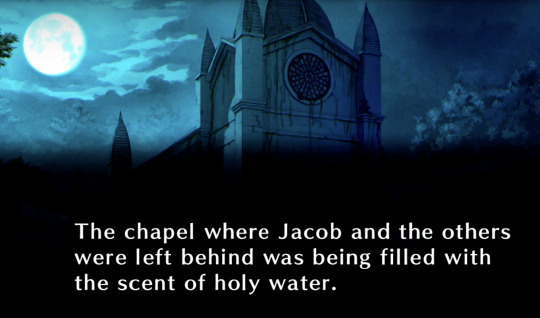
[image description: the summary text over the chapel backdrop with the text of "the chapel where Jacob and the others were left behind was being filled with the scent of holy water.]
If I could add something to Mary Jane, I would have loved for Mary or Jacob to ask Sister Ghost what “God” means (this is a conversation that happens in bonus material for Tokyo Ghoul once, actually). I would have loved to have that brought up more explicitly. But it’s also very funny that it never is.
The first definitions for a God we get are them being applied to Mary herself, with plenty of ambiguity on if the Order’s faith itself has a mother figure at its center or not. And either way it’s a fascinating play on the idea, and the themes of the novel.
Closing Thoughts, Other Connections and Ideas "Beyond the Scope of this Essay"
Anyway, all of this while playing around with everything else going on in this play, Neji’s totally, without permission, commentary on Fumi, on Tsuki’s legacy (please read the stage script, somehow the game thought it was a good idea to cut that whole specific reference even when making Kisa pick between an “erase Tsuki” option) and on Kai. On himself as an artist. ("I am the one who is strange. With my changing moods, with my hobbies. That is why everyone thinks I'm strange and avoids me.”). As with several other plays, a commentary on authority, and on creation, and on isolation and friendship and connection.
And, of course, what I’ve been holding back this whole little essay is that Mary Jane is, thematically, at its core, playing off the exact same situation as I Am Death. Like — both of these plays center around a woman pouring her emotions into an undead creature. I see you Neji. You can’t hide from me. Reading I Am Death as a Frankenstein Story remixed into an old Japanese mytho-history is a LOT of fun to do, but is, as the academics say, beyond the scope of this essay.
(and, I Am Death itself is about Neji and Chui, and the twisted, messy love-hate revenge drama they are acting out across all the routes in the game. Neji writes the plays that introduce Chui to the world. Then he runs. And spends the whole game trying to beat him (affectionate.). “Make me another like me” you say…
Literally the only thing I’ve come up with to make the “bad end” CG more compelling to me, is that this is what it’s riffing on. I like my I Am Death costumes way weirder.)
Mary Jane is a Frankenstein Story, I Am Death is a Frankenstein Story, Jack Jeanne is a Frankenstein Story.
The other, other thing I’m leaving out here is that the Order of the Shadows are OBVIOUSLY pulled from Tokyo Grand Guignol, aesthetically. And the most famous TGG play is Litchi Hikari Club, which is, say it with me, a Frankenstein Story. Also one that takes the themes of the novel (gender, love and sexuality, childhood, genius, violence, blind pursuit to the point of madness, god complexes) harder than most, but runs with it in nearly the exact opposite direction. But again, very much beyond the scope of this essay.
Also also also leaving out the fact that Tokyo Ghoul is... kind of ... not not a Frankenstein story. It certainly riffs on the motif quite a bit. Even if you've never read it, you've seen the mask design (an in universe riff on the joke.).
Even just one dimension of this play, and look how many words you've made me write Neji-senpai.
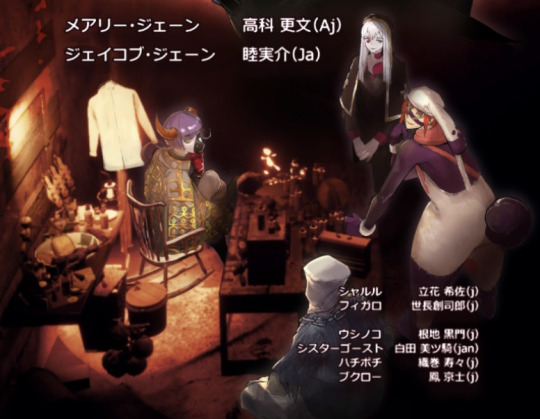
[image description: image from the bottom of the Mary Jane poster, with the cast list, showing the chapel ghosts with a focus on Ushinoko, Neji's character, looking towards the 'camera'.]
Some little Halloween Spooktacular you’ve got there. Bravo.
#jack jeanne meta#jack jeanne#Mary Jane#frankenstein#lit crit#doing lit crit of stories within stories - what a trip#meta
46 notes
·
View notes
Text
That One Time
crossposting: ao3
synopsis: Minnie thinks she remembers life as an Explosion with two older sisters, a notoriously intense celebrity father, and one of the most stylishly self-directed mothers in the world.
for kloktober day 1, favorite character or OTP.
I was planning to unveil some fankids when AOTD came out... and then I promptly killed them! I still think about them sometimes, and I hope I don't get slammed for writing nategail in the year of our lord 2023 after AOTD did a really good job at showing us what ought to happen in situations like that, but I think their family would have been funky and sweet.

full text under the cut:
Minnie was on the edge of her seat watching her family’s faces twist and search around for one another as they waited in the dead center of a mile of three-lane standstill traffic. Driving a hellcat didn’t make anyone immune… The point of the trip was to recreate something Lyssa did years ago: When asked what she wanted for her thirteenth birthday, she threw up her hands and cried out that all she wanted was a normal family. So, they rented an AirBnb within a five minute walking distance from their paternal grandparents’ house and spent two and a half weeks eating, living, and vacationing like a family of “regular jackoffs.”
Lyssa was back from Brown for spring break, and helplessly scrolling social media and trying not to be embarrassed that sitting behind her agitated dad (seething behind the wheel) looked better than taking GHB in Amsterdam like some of the Birkin-toting business administration girlies who called themselves her friends when they read her last name on the panhellenic “rush” interest form. The classes were tough, the readings were long, but aside from being asked for money or to give her father ziploc bags of slimy sex toys when she went home for the holidays, she enjoyed her new phase of life. For the trip, she pulled out some jeans and camisoles and some foam sandals from a couple years ago to make the best of their casual trip. Since she couldn’t do readings or answer emails in a moving car, she was scrolling through a grainy scan of an old Ayn Rand lit crit.
Kenzie looked and acted a lot more like her father, fidgeting and making comments about the people who had given up on civilization altogether and stepped out of their cars. Her snapchat and her instagram stories were being populated by views of the O MPH speedometer she took while her mom wasn’t blocking the shot. Without anything to post, she had nothing to do, and whatever she had coming through her headphones wasn’t entertaining enough. Time is money, and money all depends on content… Kenzie was convinced of her potential to make enough money to live on outside of the inheritance she could expect from their father, and it came at the cost of almost anything fun. Her grainy meal replacement smoothie had melted into a cloudy soup in the cupholder. She reapplied her lip gloss, pulled down the top of her stylish celery green athleisure co-ord and flipped through TikTok.
Mom wasn’t as sensitive as Lyssa, and had been returning emails the whole time they were en-route to the aquarium. Up at the front of the car, the parents had been in a gentle match of social ping-pong, with pokes, small talk, his firm hand resting on her leg or her moisturized fingers, shining like bronze, squeezing his shoulder. She re-tied her curly hair back with a scrunchie (Tampa water had pissed her hair right off… different water meant different products, and it’d been a long time since she had to face the “ethnic hair care” section at a Walmart) and made a face when Dad tried sucking air out of his empty coffee cup for the fourth time.
When she went into the bathroom at the gas station about an hour ago, he ducked in after her and bought three bottles of Johnny Bootlegger. When she came outside, he was finishing off the third one around the corner of the building. Minnie saw her glance over there, but all she did was pull the car around so someone else could get to the pump.
Now, in the jam, all he did was shake. At least, for now… There were times where it lasted five minutes, half an hour, or a week or two at a time, then left quickly, or left and came back, but periodically he’d be shaking for one reason or another. Since his eyes weren’t yellow, he wasn’t slurring his speech, and he wasn’t confused, his daughters knew they could rest easy and stand by; it would pass, it always did. As unnerving it was to see someone so big in every way crumble at the drop of a hat, there was a shared understanding that nobody was enjoying it or causing the sky to fall out on purpose, especially not him. The girls understood their job to stand by and stay the course, whether it meant minding their own business or sending cards to hospital rooms when they can’t be there.
“Fucking… cocksucking-” He touched the gearshift like there would be a point in taking it out of park. Mom laid her hand over his.
“Relax, Nathan. We don’t have anywhere to be. Oh, look-”
Someone walking around leaned against Lyssa’s door, talking to someone else in the lane beside them.
“Are you fucking kidding me?”
“Yeah, Dad, what the fuck is he doing?” Kenzie had her phone out and rolling. If her mother wouldn’t have explicitly prevented her, she would have been streaming their whole vacation live, but instead she had to take a chance and was shooting for her Instagram story. “Can you see anything?” She fixed the way her fringe laid in case she had to flip the camera around, but a couple hairs got mixed up in her eyelash extensions and had to be guided out.
“He’s just fucking… talking, I guess.” All the time, he was scrutinizing the surround and peeking into the vehicle’s blind spots (their window tint helped them avoid paparazzi and unfriendly agitators well, but one could never be too careful in a luxury car sitting in the middle of the interstate in Florida). He snatched some sunglasses from the console and pulled his hair onto the right side before punching the horn and watching the guy jump forward so suddenly that he tripped. The man caught himself from that, but his momentum sent him stumbling into someone else's rearview mirror, until he finally hit the asphalt.
Minnie laughed so hard it hurt. By the time she was slowing down, her sisters were starting up again just because she was still struggling to say anything other than “He went- Oop!” and howling. The guy’s popped-out eyes and wobbly feet were absolutely stuck in her mind like a commercial.
Giggling, her mother turned around. “Are you ok, Minnie?”
Kenzie was re-playing the video she took of the whole thing, which included Lyssa forgetting and dropping her phone when she heard the horn. It was all caught in the same shot for Kenzie, and she couldn’t have been happier to catch her sister like that. Lyssa was griping and feeling around for her phone in the floorboard.
“Yeah, mom!” She grinned from the third row and spat a curl out of her mouth. The whole car of green-eyed shower drain murderers (anything you eat is subject to having at least one long hair in it, curly or straight) settled into satisfaction with the jest and the renewed sense of ease it left behind… they didn’t have anywhere urgent to be, and they were a normal family, as normal as any family was, in the middle of the heat of the world.
But Minnie sat back. Her solitary reflection in the globby puddles of nickel, clinging to the earth like scabs, took the thought with it. Had it ever happened? Like a play, like a streak of light, like seeing without remembering, the memory passed like a train, so visually overwhelming and then definitively ended, disappearing into the distance and shrinking all the while.
#kloktober2023#metalocalypse#nategail#metalocalypse fanfic#mtl fanfic#nategail metalocalypse#my writing
9 notes
·
View notes